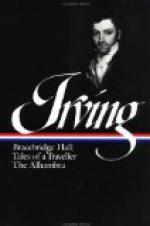The young men call old Christy their “professor of equitation,” and in accounting for the appellation, they let me into some particulars of the squire’s mode of bringing up his children. There is an odd mixture of eccentricity and good sense in all the opinions of my worthy host. His mind is like modern Gothic, where plain brick-work is set off with pointed arches and plain tracery. Though the main groundwork of his opinions is correct, yet he has a thousand little notions, picked up from old books, which stand out whimsically on the surface of his mind.
Thus, in educating his boys, he chose Peachum, Markham, and such old English writers for his manuals. At an early age he took the lads out of their mother’s hands, who was disposed, as mothers are apt to be, to make fine orderly children of them, that should keep out of sun and rain, and never soil their hands, nor tear their clothes.
In place of this, the squire turned them loose, to run free and wild about the park, without heeding wind or weather. He was also particularly attentive in making them bold and expert horsemen; and these were the days when old Christy, the huntsman, enjoyed great importance, as the lads were put under his care to practise them at the leaping-bars, and to keep an eye upon them in the chase.
The squire always objected to their using carriages of any kind, and is still a little tenacious on this point. He often rails against the universal use of carriages, and quotes the words of honest Nashe to that effect. “It was thought,” says Nashe, in his Quaternio, “a kind of solecism, and to savour of effeminacy, for a young gentleman in the flourishing time of his age to creep into a coach, and to shroud himself from wind and weather: our great delight was to out-brave the blustering boreas upon a great horse; to arm and prepare ourselves to go with Mars and Bellona into the field was our sport and pastime; coaches and caroches we left unto them for whom they were first invented, for ladies and gentlemen, and decrepit age and impotent people.”




